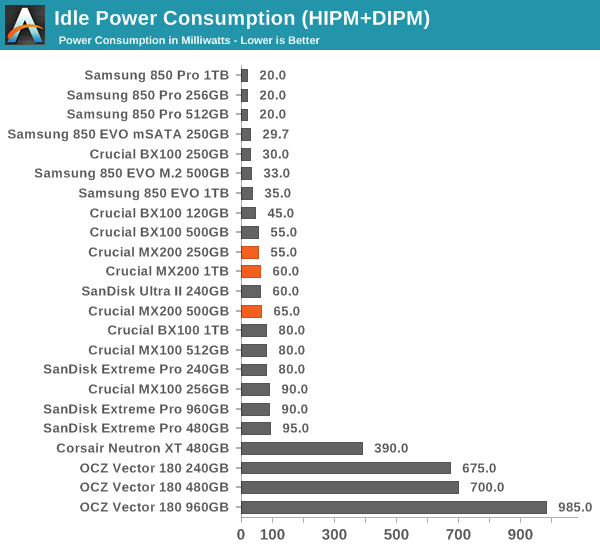Crucial MX200 (250GB, 500GB & 1TB) SSD Review
by Kristian Vättö on May 22, 2015 8:00 AM EST- Posted in
- Storage
- SSDs
- Crucial
- MX200
- Micron 16nm
Idle Power Consumption
Since we truncate idle times to 25µs in our Storage Bench traces, they don't give a fully accurate picture of real world power consumption as idle power consumption is not taken properly into account. Hence I'm still reporting idle power consumption as a separate benchmark because it's one of the most critical metrics when it comes evaluating an SSD for mobile use.
Unfortunately I still don't have a way to test DevSleep power consumption due to lack of platform support, but my testbed supports HIPM+DIPM power commands (also referred to as Slumber power), so the results give a rather accurate picture of real-world idle power consumption.

The MX200 supports both DevSleep and slumber power states, so power efficiency during idle times is good. It's not Samsung level, but at ~60mW the MX200 enjoys a small benefit over the MX100 and is overall fairly average.
TRIM Validation
The move from Windows 7 to 8.1 introduced some problems with the methodology we have previously used to test TRIM functionality, so I had to come up with a new way to test. I tested a couple of different methods, but ultimately I decided to go with the easiest one that can actually be used by anyone. The software is simply called trimcheck and it was made by a developer that goes by the name CyberShadow in GitHub.
Trimcheck tests TRIM by creating a small, unique file and then deleting it. Next the program will check whether the data is still accessible by reading the raw LBA locations. If the data that is returned by the drive is all zeros, it has received the TRIM command and TRIM is functional.
And TRIM works!











62 Comments
View All Comments
beginner99 - Friday, May 22, 2015 - link
SSD market has becoming just as boring as CPU. Time for new chipste and NVMe drives which will finally deliver an actual improvement. However for clients, it doesn't really matter...even my intel G2 was good enough.JackF - Friday, May 22, 2015 - link
I continue to be happy with my 1TB Samsung EVO drive. For $359, it is/was a good value, and consistently performs high on these comparison charts.Just out of curiosity, why is the Mushkin Reactor not included on any of the comparison charts? When I was considering an upgrade, it was at the top of my list, but you never include it in the comparison charts. You gave it a Anandtech recommendation back in February?
Teknobug - Friday, May 22, 2015 - link
Sounds like what Kingston did with the SSDNow series, older SSDNow drives were fast but the newer ones are ridiculously slow, so now the same with Crucial?MrSpadge - Saturday, May 23, 2015 - link
Take another look at the BX100 - that's a really good value drive and anything but slow.jabber - Saturday, May 23, 2015 - link
The Kingston SSDs are great value as they are usually the cheapest SSDs on Amazon etc. And in most cases are probably being used to upgrade SATA II equipped hardware. In which case they will push 260MBps all day long. Seen many labour for days over SSD specs and reviews when in fact the machine they want to upgrade doesn't have SATA III.der - Friday, May 22, 2015 - link
Crucial for CRUCIAL performance. Eek!eanazag - Friday, May 22, 2015 - link
In the SSD market I only see excitement in PCIe/NVMe designs. I believe there is a place for SATA drives, but the differentiation needs to innovative; i.e. beyond performance. Warranty, reliability, consistency, software tools, and RAID support are areas for differentiation.After looking at the value & mainstream performance products in the chart the Samsung Evo is a compelling product. Crucial's BX line is a price undercutting product compared to the Evo and it doesn't do that. I say this because the BX feature set is sub-par to the Evo. The MX is the Evo's direct competitor.
KaarlisK - Friday, May 22, 2015 - link
I do not get TRIM validation. There was never doubt that TRIM works in the sense that they LBAs contain zeroes. The question always was whether TRIMming a drive would restore degraded performance. And for some drives, it would not.Why isn't this verified any more? Or have I missed something?
creed3020 - Friday, May 22, 2015 - link
Thanks so much for the review Kristian. Now I can finally compare this in Bench to others drives when making recommendations for clients.zodiacfml - Friday, May 22, 2015 - link
Price and warranty. Anyway, it is just getting more difficult to compete with Samsung which is the case and it will just get worse.